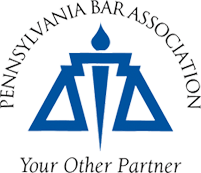HARRISBURG (Jan. 19, 2012) - The Pennsylvania Supreme Court has approved a recommendation of the Pennsylvania Bar Association (PBA) Review and Certifying Board to grant accreditation to the PBA Workers' Compensation Law Section as a certifying organization in the area of workers' compensation law.
With last week's Supreme Court order, the PBA Workers' Compensation Law Section became the first bar association entity in Pennsylvania to receive approval as a certifying organization.
"Certification of lawyers in workers' compensation law will give consumers valuable guidance, and it will afford legal practitioners the opportunity to showcase their knowledge and expertise in the area of workers' compensation law," said Matthew J. Creme Jr., PBA president.
A 12-member Certification Committee of the PBA Workers' Compensation Law Section will be responsible for the certification process, said John J. Bagnato of Johnstown, chair of the Certification Committee. A former PBA Workers' Compensation Law Section chair and Pennsylvania Bar Institute president and current PBA Zone Eight Governor, Bagnato has worked on certification issues for the PBA for almost 20 years.
Bagnato said the committee is working towards having certification applications available by late fall. A lawyer successfully completing the process will be certified for five years, after which time the lawyer could apply for recertification. Bagnato said the committee anticipates setting an application fee of up to $1,000 depending upon costs.
Applicants will be required to take a written examination composed of essay questions and multiple-choice questions. The examination will be given annually or more frequently if circumstances require, and examination questions will be revised annually to incorporate new developments and eliminate repetitive questions.
According to Bagnato, an applicant also must establish by documentation that he or she is admitted to practice in Pennsylvania, is actively engaged in the practice of law for a minimum of five years and devotes a minimum of 50 percent of his/her practice to the specialty field of worker's compensation. The applicant also must submit a variety of documents showing active practice in the workers' compensation law field and participation in Mandatory Continuing Legal Education in workers' compensation law.
Certified applicants will be permitted to use the following language when communicating their certifications to the public: "Certified as a specialist in the practice of workers' compensation law by the Pennsylvania Bar Association's Section on Workers' Compensation Law as authorized by the Pennsylvania Supreme Court."
Bagnato said the committee also will have the authority to revoke certification under certain circumstances, and the committee created an appeal process for such cases.
"Our Workers' Compensation Law Section's certification process now stands as a model for others," explained Bagnato. "I anticipate that we will be called upon to help interested PBA committees and sections that are thinking of pursuing certification in other areas of the law."
Creme said the PBA Workers' Compensation Law Section has given hundreds of hours of volunteer time and has worked cooperatively with the Pennsylvania Supreme Court to secure the accreditation.
"We owe the Workers' Compensation Section and the Pennsylvania Supreme Court a debt of gratitude," said Creme. "The public and legal practitioners alike will reap the benefits of their labor."
Founded in 1895, the Pennsylvania Bar Association strives to promote justice, professional excellence and respect for the law; improve public understanding of the legal system; facilitate access to legal services; and serve the 28,000 lawyers who are members of the association.
| 